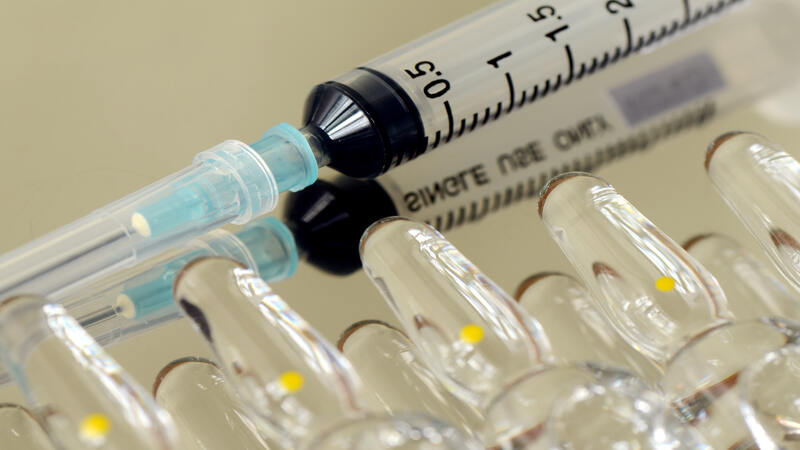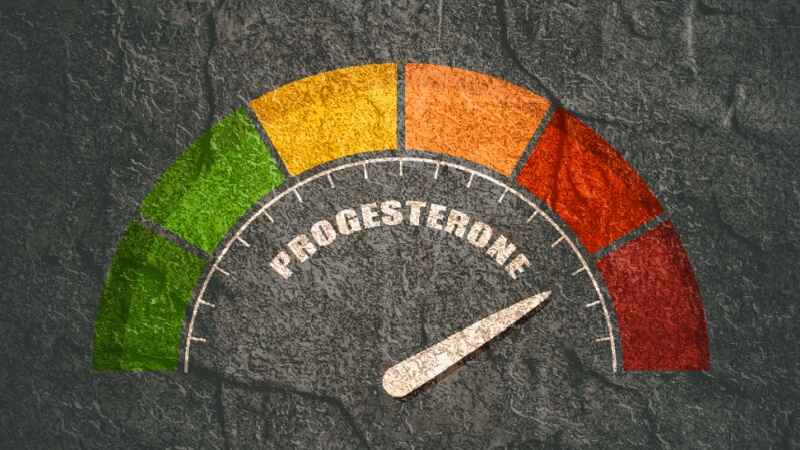
Progesterone is a key pregnancy hormone which plays a pivotal role in shaping up the body of a woman during the times of pregnancy. There are numerous pregnancy symptoms that a woman faces during those 9 months, which include food cravings, mood swings, tiredness, and lots more. Furthermore, the level of progesterone also keeps on fluctuating in a woman’s body during pregnancy. Wondering what are the consequences when progesterone level fluctuates? This article will provide you with a clear picture.
What Is Progesterone?

We all know hormones play an important role in carrying out different functions in the body. Progesterone is nothing but a hormone which is responsible for controlling the fertility and menstruation in a woman’s body [1] [2]. This hormone gets released from the corpus luteum, a mass of cells that forms in an ovary, after ovulation. Progesterone is secreted by these cells subsequent to the ovulation. It helps the uterus lining after you conceive and makes it ready for the implantation. However, if you fail to conceive then the gland will break (that is why it is also called temporary endocrine gland) and the level of progesterone in the body will go down and because of that, you will have menstruation.
How Does Progesterone Help Before And During Pregnancy?
Progesterone does play a pivotal role in gearing up the endometrium and maintaining it for the successful survival of the fetus. Here is the role of progesterone as per the phases of pregnancy:
- Luteal Phase (phase immediately after ovulation): In this phase, progesterone helps with the development of blood vessels which aids in the endometrial glands secretion. This makes the uterus lining thick to receive and nourish the fertilized eggs.
- Gestation Phase: This phase refers to the pregnancy period. At the beginning of this phase, progesterone is secreted by the corpus luteum itself. However, eventually, the placenta will take over the charge. During the gestation phase hormone progesterone helps to relax your muscles which prevents contraction and also, creates a nice atmosphere for the fetus to grow.
- Lactation Phase: Progesterone increases the number and size of milk ducts and also during the lactating phase, progesterone helps the mother by triggering milk production.
Progesterone is a very important hormone for a woman’s body during pregnancy. Therefore, it is important to have a balance in the level of this hormone
Why Do Women Need Progesterone Injections During Pregnancy?

Progesterone is vital for a healthy pregnancy, naturally produced by the ovaries and later by the placenta [2]. Progesterone injections are given during pregnancy for several reasons:
- Preventing Preterm Birth: They help maintain the uterus and prevent early contractions, reducing the risk of premature delivery, especially for those with a history of preterm birth.
- Supporting Pregnancy: Progesterone prepares the uterus for embryo implantation and sustains early pregnancy. Low progesterone levels can be supplemented with injections, which can support a healthy pregnancy and lower the chance of miscarriage.
- Managing Complications: Women with recurrent miscarriages or infertility issues due to low progesterone may benefit. By managing these issues, these injections increase the likelihood of a healthy pregnancy.
- Assisted Reproductive Technologies (ART): Progesterone injections are commonly used in IVF and similar procedures to support early pregnancy and implantation.
Overall, progesterone injections guarantee appropriate hormone levels for the health of both the mother and the fetus, especially in cases when natural production is inadequate or when there is a greater chance of pregnancy difficulties.
What Happens If Progesterone Levels Are High During Pregnancy?

Irrespective of pregnancy, maintaining the right balance of hormones in the body helps it to work optimally. When an expecting mother has a high level of progesterone in her body during pregnancy, she will experience certain symptoms such as bloating, tiredness, sex drive, and anxiety. Moreover, in some cases, she might also have endometrial receptivity. However, the progesterone level can be controlled and can easily maintain its optimum level.
How To Keep Progesterone In Control?
In order to keep the level of progesterone in the body in check, you need to have a balanced diet plan, regular exercise, stay away from alcohol and smoking, and also, sleep properly which also facilitates the maintaining of progesterone level in the body. However, in some cases, the level of progesterone could even go down which is definitely not a good thing.
What Happens If Progesterone Levels Are Too Low?

When you have a low level of progesterone in your body, you could face conditions like irregular periods, mood swings, and headaches. Also, at that time, your body will go through a period of estrogen dominance which will result in weight problems, depression, gallbladder problems, and much more. The low level of progesterone certainly poses a threat when you are looking pregnant or want to get pregnant, but you can bring normalcy with some proper steps.
Causes of Low Progesterone
Low progesterone levels can be caused by the following reasons [3]:
- Irregular ovulation or the absence of ovulation.
- Chronic stress.
- Thyroid disorders.
- Ovarian issues like cysts or premature ovarian failure.
- Unhealthy lifestyle habits.
- Certain medications.
- medical issues like adrenal dysfunction or diabetes.
Low Progesterone Symptoms

Women with low progesterone may experience various symptoms and complications due to the following symptoms [ 1 ]:
- Irregular periods
- Difficulty getting pregnant
- Increased risk of miscarriage/recurrent miscarriages
- Abnormal uterine bleeding
- Spotting and abdominal pain during pregnancy
- Premature birth
- Ectopic pregnancy
Additionally, symptoms of low progesterone can include:
- Mood fluctuations
- Breast tenderness
- Anxiety
- Depression
- Weight gain, bloating, and fluid retention
Fluctuations in progesterone levels may also contribute to migraines. Individuals experiencing these symptoms should seek medical attention to ensure a correct diagnosis and treatment plan.
What Are The Different Forms Of Progesterone Supplements?

You can take certain progesterone supplements which your doctor will recommend on the basis of the level of progesterone in your body [4] [5]. You need to tell your doctor everything about your medical history before proceeding to take progesterone supplements.
- Vaginal Gel: This progesterone supplement is prescribed only to those women who are looking forward to getting pregnant.
- Vaginal Suppository: Vaginal suppository is a type of progesterone supplement which is prescribed to avoid miscarriage and premature delivery of a pregnant woman. This is usually recommended if the woman is facing insufficiency in corpus luteum.
- Vaginal Insert: This progesterone supplement is created to be administered in the vagina.
- Progesterone Injection: This progesterone supplement is recommended to treat vaginal bleeding. This type of injection can only be prescribed by a medical practitioner.
Your doctor will tell you everything about the dosage, duration, and the usage of progesterone supplement. You need to follow the instructions of your doctor word by word.
When Should You Discontinue Taking Progesterone During Pregnancy?

The reason for taking progesterone supplements among women varies a lot. Progesterone supplements should only be taken as per the instructions from your doctor. The period of taking progesterone supplements varies a lot and it generally ranges from 9 to 12 months depending on the reason. You should start and stop taking the progesterone supplement as per your doctor’s instruction.
Are Progesterone Treatments Effective?

Progesterone treatments can be highly effective for various medical conditions and situations [2]
They are commonly used in the following scenarios:
- Fertility: Progesterone supplementation is often prescribed to support fertility, particularly in cases of luteal phase defect or inadequate progesterone production. It helps prepare the uterine lining for implantation and supports early pregnancy, increasing the chances of conception and successful pregnancy.
- Preventing Preterm Birth: Progesterone treatments, such as injections, vaginal suppositories, or oral medication, are effective in reducing the risk of preterm birth in women with a history of preterm delivery or certain risk factors. Progesterone helps maintain the uterine environment and prevent premature contractions.
- Menstrual Irregularities: In women with irregular menstrual cycles or conditions like polycystic ovary syndrome (PCOS), progesterone therapy can help regulate periods and restore hormonal balance.
While progesterone treatments are generally effective, their success may vary depending on individual factors and underlying conditions. It’s important to discuss the potential benefits and risks of progesterone therapy with a healthcare provider to determine the most appropriate treatment approach for your specific needs.
Are There Any Side Effects Of Synthesized Forms Of Progesterone?
Generally, progesterone supplements have no harmful effect and are considered safe to use. However, one can’t overlook certain possible side-effects of using these supplements such as:
- Urinal and stool color change
- Irregular Vaginal Bleeding
- Eyesight change
- Pain and swelling in legs or arms
- Skin and eyes getting yellow
- Confusion, tiredness, and dizziness
- Various allergic reactions
What Are The Safety And Precautionary Measures To Be Taken?

Mostly, progesterone supplements can be safely used provided it is taken according to the instruction of the doctors. But, in certain health conditions, it should be avoided.
- Inform your doctor in case of the severe symptoms.
- Avoid using the supplements for a long period of time as prolonged use of this hormone may bring about certain health issues.
- In case of liver or heart problems, inform your doctor early.
- Progesterone supplements should only be used to avoid premature delivery and as a part of fertility treatment. Or else It is not supposed to be used during pregnancy.
Progesterone is an important hormone for a woman’s body. It also plays an important role during pregnancy. If there is any sign of the low or high level of pregnancy which is disconcerting to you, consult with a medical practitioner because taking up any progesterone supplement.
FAQ’s
1. Can Progesterone Be Harmful In Early Pregnancy?
Progesterone is essential for supporting pregnancy and is generally regarded as safe through the early stages of pregnancy. Progesterone supplements may lower the chance of miscarriage, particularly in women who have experienced repeated miscarriages in the past.
2. How Much Progesterone Can I Take In Early Pregnancy?
The dosage of progesterone supplementation during early pregnancy can vary depending on individual factors and the specific medical advice of a healthcare provider. Generally, progesterone supplementation may be prescribed in the form of vaginal suppositories or injections, with dosages typically ranging from 200 to 400 milligrams per day.
3. Is Progesterone Good To Prevent Miscarriage?
Progesterone supplementation may be recommended for certain women at risk of miscarriage, particularly those with a history of recurrent miscarriages or certain medical conditions.
References
- Physiology, Progesterone – [https://www.ncbi.nlm.nih.gov/books/NBK558960/]
- Progesterone in pregnancy – [https://www.ncbi.nlm.nih.gov/books/NBK362730/]
- Reproductive Hormones – [https://www.endocrine.org/patient-engagement/endocrine-library/hormones-and-endocrine-function/reproductive-hormones]
- Prevention of Pregnancy Loss: Combining Progestogen Treatment and Psychological Support – [https://www.ncbi.nlm.nih.gov/pmc/articles/PMC10003391/]
- Progesterone and Progestins – [https://www.ncbi.nlm.nih.gov/books/NBK582914/]
